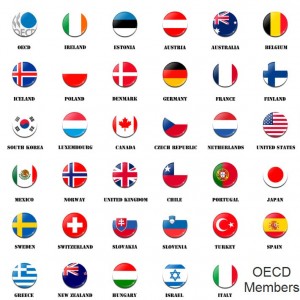The Market Has its Head Buried Deep In The Sand
Several “black swans” are looming which could inflict a financial nuclear accident on the U.S. markets and financial system. I say “black swans” in quotes because a limited audience is aware of these issues – potentially catastrophic problems that are curiously ignored by the mainstream financial media and financial markets.
The most immediate problem is the Treasury debt ceiling. The Treasury is now projected to run out of cash by mid-summer. Of course, in the spurious manner in which the markets evaluate the next trade, July may as well be a decade away. My best guess is that the “market” assumes that, after drawn out staging of DC’s version of Kabuki Theatre, Congress will raise the debt ceiling, probably up to $22 trillion. Then the Fed will extend its highly secretive “swap” operations to foreign “ally” Central Banks (hint: Belgium and Switzerland) in order to fund the onslaught of Treasury issuance that will ensue. Problem solved…or is it?
(Note: Plan B would be another one of Trump’s bewildering Executive Orders removing the debt ceiling.
Articles by Sprott Money
As Central Bankers Spin
December 25, 2016Posted with permission and written by Tim Taschler, Sprott Global
I know that I resemble the old guy in this cartoon, standing by helplessly as I watch central bankers experiment with the global economy. Bubbles are blown, again, in several asset classes. Negative interest rates have become an acceptable concept, as if they are just words and have no real economic meaning. Stock markets trade based on the next set of words from a central banker, regardless of how wrong these people have been, for almost a decade, on their ‘predictions’ and dot plots of the future. There is a Stephen King novel in the making here, something about the horrors of the people that created a gigantic problem also being the people in charge of fixing the problem they created, as if they aren’t at fault in the first place.
"Those who don’t study history are doomed to repeat it. Yet those who do study history are doomed to stand by helplessly while everyone else repeats it" – Click to enlarge
Fed rates have risen, while at the same time the FOMC downgraded the US long-term growth prospects.
A tendency that only changed with Trump’s election.
If You Can’t Touch It, You Don’t Own It
October 24, 2016The pending Brexit has, not surprisingly, caused a shakeup in the investment world, particularly in the UK. Of particular note is that, recently, asset management firms in Britain began refusing their clients the right to cash out of their mutual funds. Of the 35 billion invested in such funds, just under £20 billion has been affected.
For those readers who live in the UK, or are invested in UK mutual funds, this is reason to tremble at the knees.
So, why have these investors been refused the right to exit the funds? Well, it’s pretty simple. The trouble is that quite a few of them made the request at about the same time. Of course the management firms don’t keep enough money on hand to pay them all off, so, rather than spend all their money paying off as many clients as possible, then going out of business due to a lack of liquidity, they simply announce a freeze on redemptions.
Those who are outraged may read the fine print of their contracts and find that the fund managers have every right to halt redemptions, should “extraordinary circumstances” occur. Who defines “extraordinary circumstances?” The fund managers.
The Education Bubble: Is A Harvard MBA Worth $500,000?
October 4, 2016The Education Bubble: Is A Harvard MBA Worth $500,000?
Written by Peter Diekmeyer
College students are back at their desks this month facing bleak prospects. With tightening job markets leaving kids with no place else to go, universities continue to jack up fees.
The upshot is growing signs that America is in the midst of an “education bubble,” just as big as those in stock, bond, and real estate markets.
Case in point: four years at Harvard University now costs nearly $250,000 [1]. If you want an MBA, add another $200,000 [2].
That doesn’t include the expenses related to running around with colleagues from millionaire homes, which brings the total costs of the two degrees to well over $500,000. A family with two kids needs a cool $1 million to put them through the Harvard undergrad and MBA programs.
That’s a lot of money for a program whose most famous graduate is former President George W. Bush, a man who oversaw the largest financial bubble and worst foreign policy disaster in US history.
“Big academia” jacking up costs
Harvard isn’t alone in squeezing students. According to World Bank data, US spending on education rose from 4.8% to 5.2% of GDP between 1999 and 2011.
Read More »The Education Bubble: Is A Harvard MBA Worth $500,000?
October 4, 2016College students are back at their desks this month facing bleak prospects. With tightening job markets leaving kids with no place else to go, universities continue to jack up fees.
The upshot is growing signs that America is in the midst of an “education bubble,” just as big as those in stock, bond, and real estate markets.
Case in point: four years at Harvard University now costs nearly $250,000 [1]. If you want an MBA, add another $200,000 [2].
That doesn’t include the expenses related to running around with colleagues from millionaire homes, which brings the total costs of the two degrees to well over $500,000. A family with two kids needs a cool $1 million to put them through the Harvard undergrad and MBA programs.
That’s a lot of money for a program whose most famous graduate is former President George W. Bush, a man who oversaw the largest financial bubble and worst foreign policy disaster in US history.
“Big academia” jacking up costs
Harvard isn’t alone in squeezing students. According to World Bank data, US spending on education rose from 4.8% to 5.2% of GDP between 1999 and 2011.
Mark Perry, a researcher at the American Enterprise Institute, calculates that college tuition and textbook prices have increased by 200% since 1996, compared to just 55% for the all-items consumer price index [1].
Best Countries To Store Gold: How Did America, A Serial Defaulter, Make The Cut?
September 18, 2016[unable to retrieve full-text content]An era of slowing growth, falling corporate profits, record debt levels, and currency debauchment has many investors buying gold as a bet against global central banks. Holding that gold outside the banking system, and for some, outside one’s own country, are increasingly popular options. Canada, Switzerland, and four other countries have particularly attractive characteristics.
Read More »USA: The New Switzerland?
February 29, 2016Hold your real assets outside of the banking system in a private international facility –> http://www.321gold.com/info/053015_sprott.html
USA: The New Switzerland?
Written by Jeff Thomas (CLICK FOR ORIGINAL)
At one time, tax havens took great pride in calling themselves just that, since low-tax jurisdictions provide people with freedom from oppressive taxation.
But, in recent decades, the Organisation for Economic Cooperation and Development (OECD, based in France, but largely funded and controlled by the US) has been on a rampage to crush tax havens. The attacks have been regular and forceful and, although tax havens still exist around the world, every one of them has caved to a greater or lesser degree to ever more stringent OECD “international practices.” Presently, all tax havens live in fear of the OECD and its powerful enforcer, the US.
No measure has been more devastating to freedom from taxation than the US Foreign Account Tax Compliance Act (FATCA). The secret of its success is that the US fines banking institutions for not following the arbitrary FATCA guidelines. How can one country fine a bank in another country if that bank is following the laws of the country in which it’s located? Well, failure to pay the fine may result in the US cutting the bank out of international transfers in the SWIFT system, which would collapse the bank.






